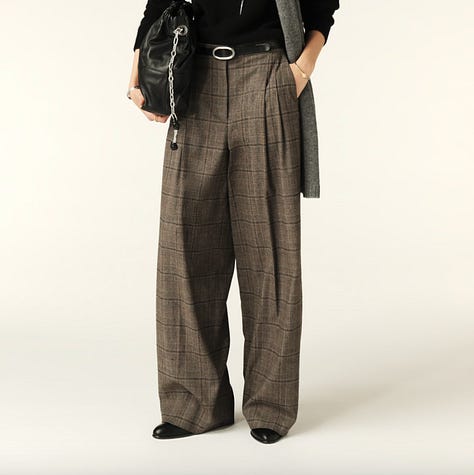Iconic turned toxic: Why influencers need to stop founding brands
Matilda Djerf’s empire is crumbling - what does it say about influencer brands?
The Swedish influencer, Matilda Djerf, has found herself in hot water following claims of bullying and body-shaming at her company Djerf Avenue.
The 27-year-old lifestyle influencer has been accused of viciously bullying her employees and ‘regularly’ making them ‘cry’.
Djerf has defended herself in a statement saying: “I don't recognise myself in all the claims that have been made, and I've chosen not to comment on individual cases. However, I do believe it's valuable that these concerns are being raised, as it gives both me and Djerf Avenue the opportunity to grow and improve.”
Having been the most idolised influencer in the lifestyle space, Djerf is now facing a rapid descent, with fans vowing ‘never [to] purchase anything again’ from her company.
Djerf’s clothing brand focuses on values of inclusivity, sustainability and kindness and even landed Matilda on the 2023 Forbes 30 under 30 list, as Djerf Avenue raised a revenue of around $34.5 million in 2022 alone.

However, fans left right and centre are now boycotting the brand - and with Matilda’s name and face on the company - does this mean the empire is collapsing for good?
Influencer-led brands are tricky territories to negotiate. When the head of the brand faces cancellation - it leaves the whole company in a state of turmoil. Cancellation, for those unaware, refers to a public backlash severe enough to tarnish one’s reputation and, often, livelihood. For influencers whose personal image is their currency, the stakes are particularly high, and when controversy strikes, their brands inevitably bear the brunt.

But brands with influencers at the helm are incredibly appealing for investors, as they are often immediate hits. This is because they begin by having a known and trusted face selling the products, so a loyal customer base is automatically garnered and followers feel personally connected - the promotion simply does itself. However, this quick rise to sensation means there’s an equally rapid descent.
Consider the case of YouTuber-turned-entrepreneur James Charles, who launched his make-ip collaboration with Morphe amid his meteoric rise. Allegations of sexual misconduct in 2021, however, saw his popularity plummet, taking his brand credibility with it as Morphe publicly cut all business ties.

Despite his attempt at a comeback, his controversies mean he is unable to ever cultivate as much hype around future business endeavours he puts his name to. Unlike legacy brands that can weather PR crises by distancing themselves from individual employees, influencer-founded companies have no such luxury. When their figurehead falls from grace, the entire enterprise is tainted.
Djerf’s wrongdoings seem to have garnered more media attention than Charles however - and she certainly isn’t the first female lifestyle mogul to experience global cancellation. OG lifestyle influencer Martha Stewart was left to pick up the pieces of her namesake brand in the mid 2000s after serving five months in prison for insider trading and the obstruction of justice.
Behind the scenes, Stewart began a comeback campaign and her media company was able to return to profitability, with Stewart herself rejoining the board of directors in 2011. Her personal brand, however, was in tatters. How could the house-proud darling of feel-good family hosting commit such shocking crimes?
Oddly, Stewart’s personal comeback came with an Instagram thirst trap of all things. The lifestyle tycoon posted a sultry selfie lying in her Hamptons pool in 2020.
People flooded the comments with “You have some nerve looking this HOT at 78 years young” and “Martha is here for a hot girl summer”. Just goes to show, in the internet age, you can truly never predict one’s redemption story - but it will probably involve judging a woman’s appearance and equating it with her worth.
As for Djerf, her redemption arch is currently unclear. Unlike Stewart or Charles, Djerf isn’t being accused of illegal wrongdoing, she is being called out as a mean bully. Something arguably more difficult to come back from, as it is a personality defect, not a lapse in judgement.

Many have predicted Djerf to take a step back from social media and return in a couple of months apologising - saying she has had time to reflect, grow and is truly sorry for creating an uncomfortable workplace environment. Then, everyone will move on and the saga will just become another footnote under ‘controversies’ on Djerf’s Wikipedia page.
But is it time to break this boring cycle of icon to villain to cancelled to mediocre celeb?
People make mistakes - and it’s important to understand that and look at each case individually - but a mistake that is a slip of the tongue in an interview (see Molly-Mae’s “we all have the same 24-hours” controversy) seems very different to years of emotional workplace bullying.
Looking at what someone actually did is essential to determining their future in the cultural zeitgeist. Obviously, evidence is crucial, and this story has only garnered so much attention due to its gargantuan mound of receipts and statements from former employees.
So, will Djerf ever win us back with her bombshell blowout and sartorial style? Or is this the nail in the coffin for fake internet personalities? All I know is the internet can forgive, but certainly never forgets.
Get the dupe Djerf look, here…














